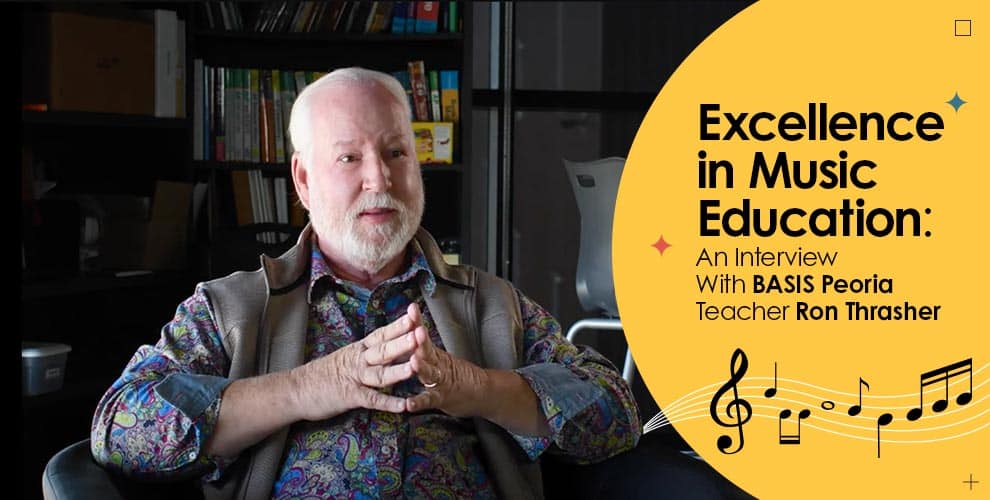Excellence in Music Education: An Interview With BASIS Peoria Teacher Ron Thrasher
Every year in March, the National Association for Music Education helps schools celebrate Music in Our Schools Month®. The purpose of this month of observance is to raise awareness for the importance of music education.
At BASIS Charter Schools, we know how powerful music can be. Music education is incorporated into our curriculum from the start, with primary school students learning how to read musical notation, how to describe different styles of music, and how to perform multi-part musical pieces. Once students reach grade 6, they are able to continue taking music courses as electives. Here, the focus shifts to technique and performance.
During this year’s Music in Our Schools Month®, we sat down with Ron Thrasher, a music teacher at BASIS Peoria. Mr. Thrasher teaches Music for grade 5 students and Strings for grades 6 and 7. In the interview below, he discusses what he enjoys about teaching music and what makes BASIS Charter Schools’ music program unique.
What led you to BASIS Peoria?
Mr. Thrasher: I had retired from teaching before starting at BASIS. But after a few years, I was looking for an opportunity to do some teaching in a way that would allow me to have autonomy and creative freedom over my lessons. I found that at BASIS Peoria.
When you first started teaching here, was there anything about the music program at BASIS Charter Schools that stood out to you?
Mr. Thrasher: Absolutely. When I started teaching Strings at BASIS Peoria, I found amazing students with amazing abilities. They were able to play violins, violas, and cellos on quite a high performance level. Some of our strings players and vocalists were even going to All-State and performing with the top band, orchestra, and choir students from around Arizona.
I started trying to figure out how this phenomena happened, and what I needed to do to keep this success going. What I found was that the students here really wanted to be able to express themselves through music, and their parents were very supportive of that. We have a lot of families who are heavily invested in our music program, which I think goes a long way. The classroom environment at BASIS is also very respectful and positive, which makes for a great experience.
Can you tell me more about the classes you teach? What do you like about teaching music to students in this age group?
Mr. Thrasher: I teach grade 6 Strings, which is our beginning class, as well as grade 7 Strings, which is our intermediate class. And what I do is help bring out students’ natural ability, teaching them techniques that make the music breathtaking. One thing I really like about teaching Strings is knowing that my students can carry these skills with them as far as they want, and for as long as they want. Even when they’re older, they can still pull out their violin and play some music.
I also teach grade 5 Music. In that class, we have students singing songs in five different languages—Latin, English, French, German, Italian. And the students really love those songs, especially the French song that we learned last semester.
At the end of the day, the students are what make my job so fulfilling. They are very dedicated, especially when you get into the upper grades. They didn’t sign up for a music elective to play or sing badly—they signed up to be excellent. And they pursue excellence in music as well as in all of their other classes. Some of the kids I’m teaching, I have no other word for them but genius. They show flashes of brilliance all the time.
We’re chatting in March, which is Music In Our Schools Month®. In your opinion, what makes music education so important for middle school students?
Mr. Thrasher: I think there are a lot of benefits of engaging with classical music. It can increase learning activity, improve your concentration, make you more creative… At the beginning of this school year, I told my grade 7 students, “We are going to play the world’s greatest music. We are going to play the music that you heard in your mind when you were first handed a violin.” And as we learn pieces like the Pachelbel Canon or Mozart’s Adagio, we really dive into the depth and soul of the music. I think the experience of learning these classical pieces is a very powerful thing that can have far-reaching effects.
Is there anything you want parents to know about the music education offered at BASIS Charter Schools?
Mr. Thrasher: If there are any parents out there wondering if their son who plays the cello will have a place at our schools, the answer is yes. Not only is music education an option for our students in middle school and high school—it’s encouraged, and it’s excellent.
We appreciate everything Mr. Thrasher does for our BASIS Peoria community and thank him for taking the time to speak with us! Check out the video below for more from Mr. Thrasher!
To learn more about BASIS Charter Schools, find a school near you and sign up for a school tour. You can also join our interest list to stay in the loop with the latest news and updates from our network.
Interview has been edited for length and clarity.






